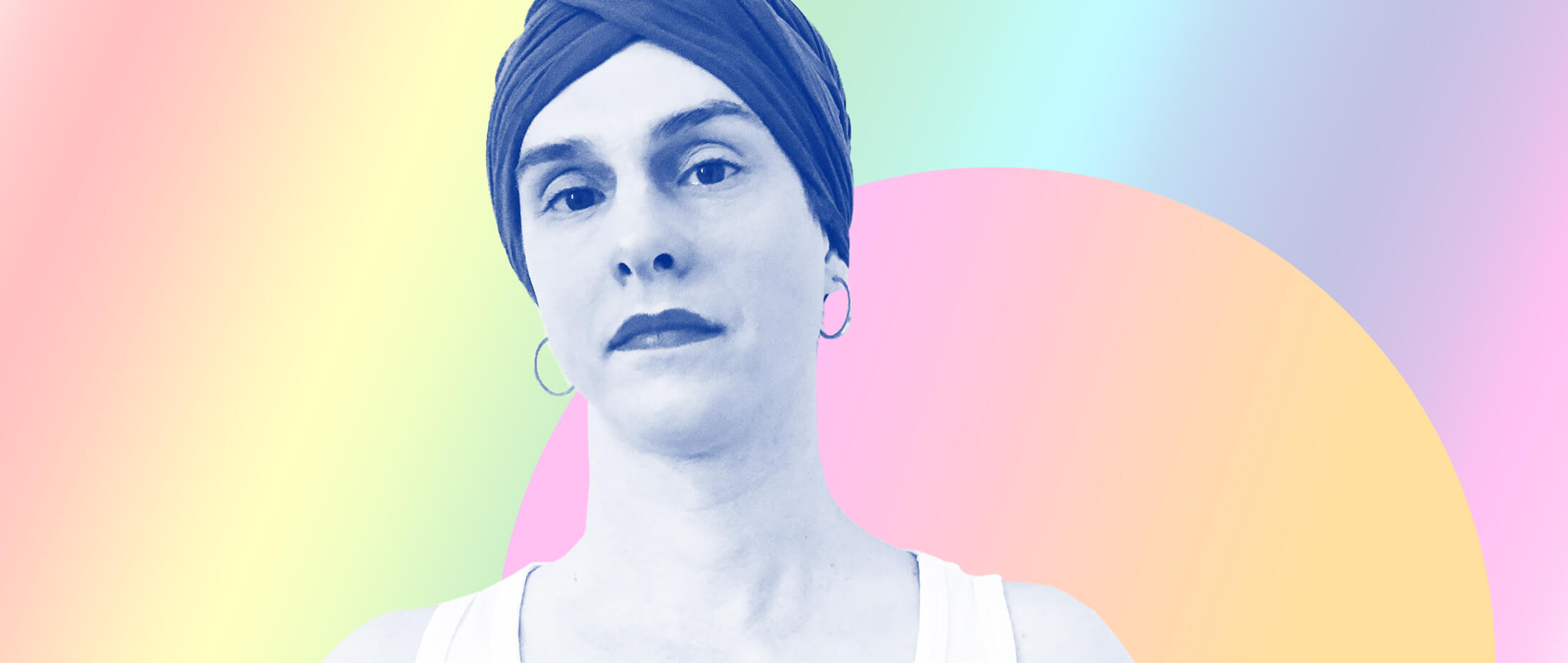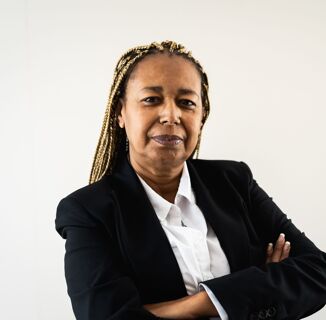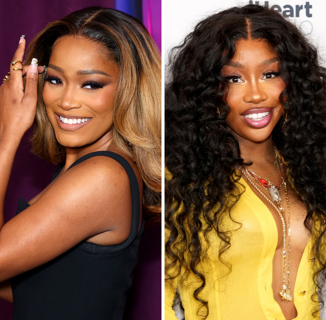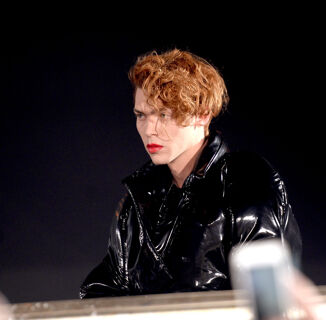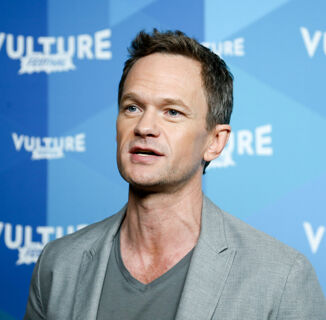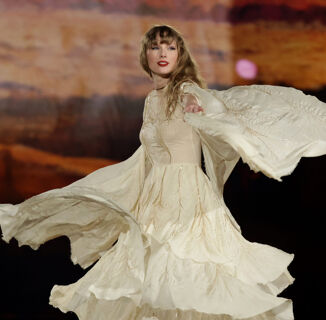
Gavin Russom and I weren’t supposed to actually meet.
I was set up to speak over the phone with the prolific musician, most famous as a member of the dance-punk outfit LCD Soundsystem, through Russom’s publicists. It was July 4, and as I sat on my messenger bag under a tree in Central Park, waiting for our interview, every journalist’s worst nightmare came true: My phone hit 16% battery life. It was going to die—and soon— but luckily fate intervened.
Russom was meeting a friend at 79th and 5th, just blocks away from the encampment I set up to beat the torrid New York heat—which pushed 90 degrees on a particularly humid day, even by the city’s already punishing standards. To talk about the weather is a cliché, but it’s the only appropriate way to preface our wide-ranging conversation, one that unfolded as we walked toward each other on our phones, racing against my battery. We agreed to meet at Belvedere Castle, where we would conclude the interview, and over the 45 minutes we spent finding each other, both of became drenched in sweat. Russom gave me a big, soggy hug when we finally locked eyes among the crowd of tourists, like wandering strangers in a Richard Linklater movie.
Here’s another cliché: I thought Russom would be taller. Old publicity photos show the musical polymath, who has played in a diverse line-up of projects including The Crystal Ark and Black Leotard Front, with a Gandalf beard and a faraway look. Today, Russom was clean-shaven, outfitted with dark sunglasses and an Audrey Hepburn headwrap. The 43-year-old was serving old Hollywood glamour meets Brooklyn street punk, a nod to the city Russom has called home since 1997. Petite and ebullient, Russom exudes the easy warmth of meeting an old friend.

And had we but world enough and time, it felt like I could have told her my entire life.
The pronoun is not a typo. A lot has changed for Russom in the past year. LCD Soundsystem, which disbanded with an ornate farewell concert in 2011, announced it would be getting back together last year. The New York-based group, one of the most widely acclaimed bands of its era, will be releasing a new album, American Dream, in September. But behind the scenes, Russom’s own evolution mirrored the rebirth of her famous band.
She began quietly coming out as trans earlier this year, after years of fits and starts.
“This is my fifth decade being alive,” she told me, “and in each of those decades, there’s been a time where I’ve tried to say, ‘Hey, I think I’m transgender!’ This was even before that word existed.”
Russom, who grew up in Providence in the 1970s and 80s, had the ideal childhood for a trans kid coming to terms with their gender identity. Her father was a professor at Brown University, teaching English poetry, and her mother was the daughter of a diplomat, raised in the Middle East. Russom’s musical upbringing reflected these diverse influences. On any given day you could hear jazz, blues, or folk music in her parents’ home, everything from Chuck Berry and Charlie Parker to Umm Kulthum. Her aunt was a piano teacher, and her cousins—who also found their way to electronica later in life—studied classical music. This philosophy of music would not only define her genre-busting creative output but also her gender expression.
Since a young age, Russom identified “along the feminine spectrum.” As a student at Martin Luther King Elementary School, she remembers going to school with black-and-white saddle shoes on, not thinking of them as un-masculine. They just felt right on her feet, like Cinderella’s foot sliding effortlessly into the glass slipper. The other students in her 2nd grade class, though, screamed that she was wearing “girl shoes.”
But despite the “mass amounts of cultural material” she was exposed to, Russom would struggle to bridge the binaries in her own identity for years—what she calls “or-like thinking.” “You have to be a classical musician or play in punk bands,” Russom said.
“You have to be a boy or a girl.”
The story of Russom’s musical trajectory is powerfully intertwined with her slow and still blossoming realization of her trans femininity. (She still prefers to go by “Gavin,” although Russom says that may change.) She joined her first music group as a preteen, playing punk in her friend’s basement. Russom was attracted to the “freedom and liberation” that the punk scene represented, one that made space for queer rock icons like Iggy Pop, Darby Crash, and most recently Laura Jane Grace, the Against Me! singer who came out in a 2012 Rolling Stone profile. But after discovering acid house, Russom and her cousin, the neo-disco musician Kelley Polar, formed “Acid Barons” in high school.
“His dad was a computer programmer, and he had a friend who had gotten excited about electronic music in the early 1980s and had a little studio,” Russom said. “I ran over there after hearing this music on late night radio shows and was like: We have to make acid house music.”
Russom would go onto enroll at Bard College in 1992, where she studied under feminist music theorist Benjamin Boretz. Academia, though, was her father’s calling, not hers. She moved to New York the same month that Daft Punk’s Homework was released, a moment when the Europop that dominated the music charts would give way to a house revival. What drew her to the city’s nightclub scene was a feeling of “boundarylessness.” Russom describes the dancefloor as a safe haven where queer clubgoers found shelter, escaping the brutality of the AIDS epidemic and the first Bush era. Here, queer people could express themselves—whether it was to experiment with identity or be someone they couldn’t be anywhere else.
If punk helped Russom first come into contact with out queer people, what made the dance scene so radiant was its kaleidoscope of gender expressions. Russom described being a DJ as an “liminal” experience, one where you “observe people on a really detailed level but don’t end up interacting with them.” But she said there’s a power in witnessing—seeing out trans women unapologetically live their lives, even if from inside a booth.
“It gives me hope for the future to see the courage and creativity of a much younger generation of trans women,” Russom said. “Clubs are where I’ve encountered a lot of that.”

Russom would spend five years in Berlin, which represented a kind of pilgrimage, even if she didn’t know it at the time. The German capital was home to the work of Magnus Hirschfeld, the sexologist who started what is widely considered to be the first advocacy group for LGBT rights. Hirschfeld’s Scientific-Humanitarian Committee, founded in 1897, treated transgender people not as if they were an abomination before God but human beings, ones deserving of dignity and respect. Russom said that that the exploration of gender is an “important cultural rite” for Berliners.
That environment, one where she could connect with queer history, was critical in helping Russom come to terms with her gender identity. She moved to Berlin in 2004 and came back to the United States in 2009. Life, though, continued to interrupt the flourishing of her fully realized self.
When Russom returned to New York, she quickly joined LCD Soundsystem to help record This Is Happening, initially intended to be the band’s final LP. The indie group has a sprawling cast of contributors (including Nancy Whang of The Juan MacLean and Tyler Pope of !!!), but the 2010 album would mark Russom’s first as a full-fledged member of the group. She has been working with frontman James Murphy in the studio since the early 2000s. Russom helped to produce the band’s self-titled debut album, which featured LCD Soundsystem’s breakout hit, “Daft Punk is Playing at My House,” and its magnum opus, Sound of Silver.

But as LCD Soundsystem was set to go on tour to promote its comeback record, Russom said that she “could not imagine” spending the next year continuing to pretend to be someone that she’s not. “My body rejected it in the same way that it now utterly rejects going into a men’s bathroom or when somebody calls me ‘sir,’” she told me.
Russom said that her bandmates have been “really supportive” about her transition: “The general feeling in the group is that will make the band better.” Calling Murphy the “creative director” of LCD Soundsystem, she claimed that his approach to music is bringing together a group of performers with unique musical skillsets and allowing them to be inspired by each other. Since coming out, Russom has felt more connected on stage—both to her colleagues and to the music. She’s able to own the space in a new way. Performing “Call the Police” on the May 6 episode of Saturday Night Live, Russom’s joyful exuberance shined through. Dressed in a gray t-shirt, it’s hard not to smile as she rocks out behind the synthesizer.
“I’m the happiest I’ve ever been,” Russom said, “but I have my good days and my bad days. On my bad days, it really sucks and I wait until I get home to go to the bathroom—which is such a basic thing.”
One of the biggest struggles with coming out, she said, is the hypervisibility that entails being a transgender woman in a country that’s become increasingly hostile to the existence of girls like her. In the past two years, numerous states have debated the passage of discriminatory laws that prevent trans people from using public restrooms that most closely correspond with their gender identity. North Carolina passed House Bill 2 in 2016, a controversial law that would later be repealed and replaced following public backlash. The new version is nearly identical to the old one. Texas will head into a special session of its legislature this month to deliberate over Senate Bill 6, which would target trans students in public schools.

When I asked Russom how she felt about playing in states that are debating her right to exist, she said it was a “tough question.” It’s one that has been on her mind, however. Even living in New York, where trans women are protected in public accommodations under statewide nondiscrimination laws, using a public restroom can be “unpleasant” and “scary.”
One story that Russom told me perfectly encapsulates the trepidation and paranoia that accompanies with being visibly trans.
Earlier this year, she met a friend at a Macy’s in Midtown Manhattan. Russom got there early and had to use the bathroom. There was a long line for the women’s room; at the front of the line, a man was standing by the door—likely waiting for his wife or girlfriend. She thought about that man and what he could do to her, the violence and harassment that are a horrific reality in too many women’s lives. So Russom searched frantically for a gender-neutral bathroom in the department store, anywhere else she could go that wasn’t a men’s room. She didn’t find one.
Panicked, Russom texted her friend to ask what she should do. “Go for it,” the friend said. Russom went to the women’s room and waited in line. Nothing happened.
Confronting these fears is a process, and it’s one that will take time. When she’s walking home alone late at night, Russom often worries that the men she sees walking past are going to read her as a cisgender woman and catcall her or read her as transgender and beat her. These concerns are unfortunately all too real: At the time of writing, 15 transgender people have been murdered so far this year, all of whom were women.
But a major hurdle in her own transition has been confronting her own internalized transphobia. At the same time that she began coming out to friends and family, Russom started taking kung fu. It immediately felt right, as if it were something her body needed and wanted to do. During those first sessions, though, Russom couldn’t shake the nagging thought that she would have to give up martial arts because of her gender identity. She couldn’t be both transgender and a martial artist. If a female friend had expressed those same opinions, Russom would have immediately rejected them. But coming from a place of deep societal stigma, they were harder to purge.
“I am someone who has spoken out on both women’s rights and trans rights for a long time,” Russom said, “but when I started to transition myself, that was one of the most shocking things. I’m carrying so many of these things around with me. That’s been challenging to work through— having those preconditioned societal ideas of what transgender women can do.”

Just as seeing out trans women claim the dancefloor helped give her the strength to be who she is, Russom stressed the importance of possibility models in her life. These people showed her that she can be everything society told her she couldn’t. She cited the vibrant community of trans women in New York doing boundary-pushing work, including artist Juliana Huxtable, journalist Diana Tourjee, and musician Macy Rodman. This work, she said, connects to the legacy of women like Sylvia Rivera and Marsha P. Johnson. These trans activists fought on the front lines for queer liberation at the Stonewall Riots in 1969, a fight that is more important than ever in the age of Donald Trump.
“All of these folks are people whose being out in the world were very helpful to me,” said Russom, who initially sought out support groups at the New York LGBT Center after coming out. “For people of transgender experience, walking out of the house in a way they feel comfortable is a revolutionary act. It’s resistance.”
Six months into the new administration, Russom couldn’t be going public about her identity at a more pivotal moment. Since taking office, Trump has consistently rolled back trans rights. In February, the Departments of Education and Justice repealed guidelines passed under the Obama administration that permitted transgender students to use the correct bathroom and pronouns at school. Questions on trans identity have been removed from federal surveys on homeless youth and services for seniors, and these have yet to be restored.
Although she hopes to create a platform for others to be heard, particularly trans women of color, Russom fully understands the responsibility that her public persona entails. Many LCD Soundsystem listeners might not know an out trans person in their daily lives. For example, seventy percent of Americans say they do not, according to recent statistics from the Pew Research Center, but many Americans have at least heard of LCD Soundsystem.
It’s easy to harbor prejudice, she said, “when you’ve never encountered a person who is part of the group that you’re prejudiced against.” They might never meet in real life, but fans on the other side of the issue now know Russom through her music.
But perhaps more than anything, Russom would like to give others what a community of bold, fearless trans women gave her: the space to be visible.
“For anybody who is struggling with their gender identity or who wants to come out and is afraid to,” Russom said, “what would be better than giving someone permission to do that through my performance? That’s the ultimate. It’s what other people gave to me, so I’d love to pass that along to other people, too.”
Russom and I would speak once more following our unintentional rendezvous. This time I was in my apartment and she was just walking in the door of hers, tired after a long day of preparing for what’s set to be the biggest week of her life. LCD Soundsystem is headlining this weekend’s Pitchfork Music Festival, and Russom will performing at Femmes’ Room, a DJ set scheduled at Chicago’s Berlin nightclub. The event is for trans feminine folks. Before we spoke for the second time, she stayed up most of the night thinking of what to say. This is the first time, after all, that fans would get the chance to get to know her—the real her.
And having accidentally met Gavin Russom, I can say with authority: You’re going to fall in love with her, too.
Help make sure LGBTQ+ stories are being told...
We can't rely on mainstream media to tell our stories. That's why we don't lock our articles behind a paywall. Will you support our mission with a contribution today?
Cancel anytime · Proudly LGBTQ+ owned and operated
Read More in Culture
The Latest on INTO
Subscribe to get a twice-weekly dose of queer news, updates, and insights from the INTO team.
in Your Inbox

